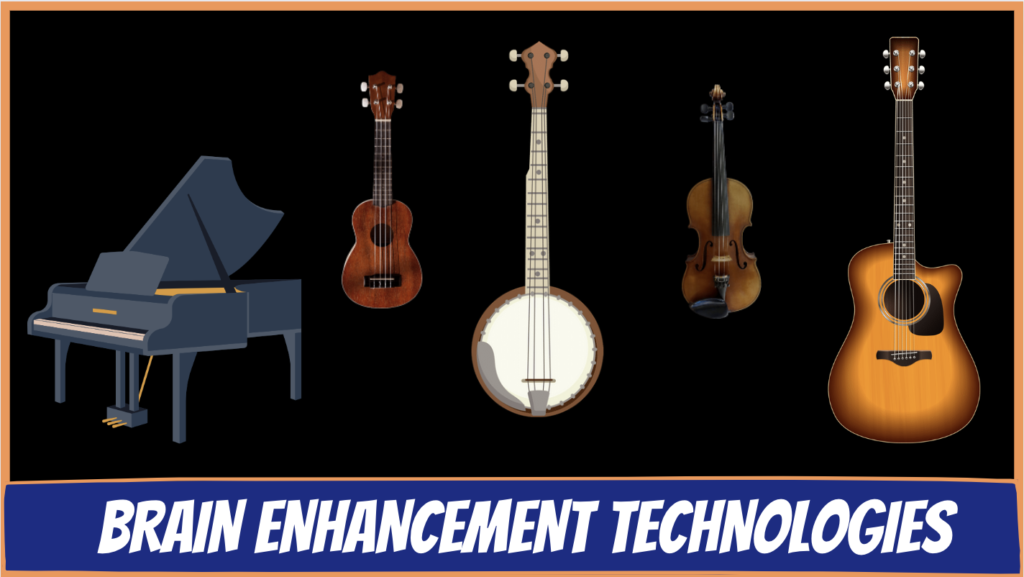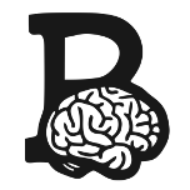TEXT
Okay, welcome to another Brainjo Bite. So as I’m recording this, it is the start of the new year, January, 2023, and being the new year, some of you out there may have set some goals that you want to accomplish this year. Maybe you’ve decided to learn a new instrument like the banjo or a new style of playing, or maybe you’ve played music at some point in your life and you’ve been telling yourself for years that you’re gonna get back. Or maybe you have an entirely unrelated goal.
Regardless, in this episode, I’m gonna talk about 5 different ways to help you embrace and tackle challenges this year.
So why talk about this? Well, having studied the science of learning and how people get better at things, along with having worked with thousands of people, I can tell you that mindset and how we think about approaching challenges is the single best predictor of someone’s ultimate success.
[00:01:00] It’s what allows you to push through the inevitable bumps in the road. And this is because again, our success has nothing to do with our talent, and everything to do with how we train our brain.So it’s not about the brain that you have, but the brain that you mold through practice, and mindset and attitudes are what determine whether or not you’re able to maintain the motivation to keep going .
At the start of anything new, including at the start of the year, we’re often at our peak motivation. And all too often that motivation kind of fizzles out over time, and it fizzles out because of the stories that we tell ourselves or our mindsets and attitudes. And I think of those things as zero multipliers, meaning, our mindsets will ultimately undermine or negate all of our other efforts, just as multiplying any number by zero still gives you zero, no matter how big that number is. So in this case, no matter what else you do, if you don’t have a mindset that’s conducive to success, you won’t get to where you want to go.
Ultimately it’s what spells the difference between whether or not your time spent training and practicing is joyful and satisfying or filled with frustration and disappointment. And again, the difference has everything to do with what’s happening between our ears.
All right, so let’s get to 5 things to help you tackle challenges this year.
The first is to remember that the purpose of practice is to simulate the brain to change and to steer that change in the direction that we desire. So our goal is not to improve within the span of a single practice session because that’s not how we build knowledge and skills. Because our conscious mind is a bottleneck, the only way to increase our knowledge and skills over time is to make those skills automatic, and we do so by creating dedicated neural networks that can run beneath conscious control.
And creating those networks is why we practice. But the structural changes in the brain that happen to support the creation of a network like that don’t happen within the span of a single session. Rather, they happen over the course of days, weeks, months, and even years.
Now it’s true that you can improve during this span of a single session. You’ve probably experienced that. But the point is that the physiological processes that lead to that improvement are temporary, and they are not the processes that will allow for the accumulation of knowledge and skills.
As you may have heard me talk about in prior episodes, if you look at performance at the end of a session versus after an interval of sleep, we will see the improvements are greater after the interval of sleep than at the end of the session. And that’s because those changes that are happening that actually support the accumulation of knowledge are happening during sleep are not the same as the ones that led to that improvement during the span of a single session. You can kind of think of this as the difference between working and long-term memory. So for example, if you have a phone number or an address that you need to remember for a few minutes, you might recite it back to yourself multiple times to keep it in working memory, and you might be able to do so. So you think of that like your RAM in your computer.
But it’s unlikely that that memory of that number or address is going to be in your memory the next day. And that’s because the changes that allowed your brain to keep it in working memory are entirely different than the changes that would have to happen to transfer it into long-term memory. And so it’s the same with practice.
Let’s say you’re practicing a new lick or a difficult section of a song or a tricky chord progression and you do it for 20 minutes or so, and by minute 20 you’re doing better. Those changes in the brain that are allowing you to reap those improvements are temporary, analogous to our working memory, but what we want to happen is for that to transfer over to the brain’s hard drive, so to speak, so it starts moving into long-term memory.
And the actual changes in the brain that support the development of that type of memory and the creation of those dedicated neural networks that require structural remodeling, all of that happens almost exclusively during sleep. So your mission during practice is number one, to signal your brain that what you’re doing is important enough to make a lasting change for it to encode it into long-term memory, and number two, to give it quality data upon which to make those changes, to make sure it’s the memory you want, right?
If you spend 20 minutes trying to memorize the wrong phone number, you’re gonna remember the wrong phone number. So this doesn’t mean that you ignore the quality of your efforts or how you’re doing because that’s how you know whether you’re putting in good inputs. But it does mean whether or not you make performance improvements from the beginning to the end is not the focus, yet people oftentimes get discouraged because they’re not making the progress they want to be making within the span of a single session when that’s not even the goal.
All right, so that’s number one.
Number two, treat your practice or your training like a scientist.
So when you’re evaluating yourself and evaluating how you’re doing, think like a scientist. Imagine that you are given a recording of someone that you don’t know, and your only job is to listen and evaluate how they’re doing and what sorts of things that you think they need to work on to move them forward. So all that really matters is understanding where you are now and where you need to go next.
You’re a scientist collecting data, and data is neither good or bad. It’s not about making a value judgment. It’s just about accurately assessing the state of affairs right now and using that to determine the next best step for moving forward. Everyone who is learning anything is on different points along the learning timeline, just like children who are learning to walk or talk, and we don’t say that a one-year-old child is a bad walker because they’re still wobbly, we say that they’re just still learning how to walk. They’re earlier on in the timeline of learning. And the only difference between a beginning, intermediate, or expert musician is where they are on that learning timeline. So your job when practicing and evaluating your efforts is just to collect data. Data itself is neither good nor bad, it’s just data.
Also remember that this kind of evaluation is part of the learning process. What I mean by that is that in addition to the technical components of playing, learning, music also requires developing a set of perceptual skills. So the closer you listen and evaluate, the better those skills will become. Learning anything is really just one grand never-ending science experiment. So approach it with a spirit of curiosity and approach it knowing that some things you do may work well and others may not. And the goal is really just to collect information on what’s working and what isn’t.
The third thing that can be helpful is when you do evaluate and talk to yourself, as we often do, imagine that you are a teacher or a coach and your student, in this case you, is some somebody else.
One unfortunate truth about human nature is that we tend to be a lot harder on ourselves than we would be on other people, especially other people we care. When someone we care about makes a mistake, we might say, “oh, don’t worry, mistakes happen, and they are a normal and necessary part of the learning process, right? Just give your best effort because that’s all you can control anyhow.”
Yet when we make mistakes, we say things like “I’m such an idiot. I make those same mistakes every time. Who am I kidding? I’m not cut out to do this.”
Now you probably never say things like that to somebody you care about, and yet people have this kind of self-talk all the time, and it’s really unhelpful. And without a doubt, positive and constructive self-talk is another key feature of the most successful learners, so be compassionate and empathetic with yourself.
The fourth thing you can do is to view practice through the lens of its brain benefits.
So remember that the greater the struggle, the greater you have to work at something, the greater its benefit tends to be for your brain. So that means when you find something especially challenging, it means your brain is having to work really hard. Yet oftentimes struggle leads to frustration in this particular setting.
So to see how that shift in perspective can be helpful, think about our attitudes towards working out our exercising. Imagine you go to the gym and you do some pushups or pullups, and you go until you can’t do anymore and you’re exhausted.
Or you go for a run and you go until you can’t run anymore. So you push yourself to failure. How would you feel about that? You’d feel pretty great, right? You feel like you’ve done as much as you possibly can do with respect to that exercise session right? Now, why do you feel that way? Because you know that the benefits of exercise come from the responses or adaptations to it, which is directly correlated to the amount of effort that you put in.
The benefits aren’t happening right then and there in that exercise session, right? Exercise is actually a stressor and from a health standpoint is actually negative in the very short term, but it’s those adaptations that are triggered by the exercise that are beneficial over the long term and why we think the greater the effort, the more benefit that we’ve gotten out of an exercise.
And the exact same thing is true of the brain. When something is challenging, it stimulates our brain to adapt to that challenge, and it’s those adaptations that are what keeps it healthy and fit. And the reason that brains deteriorate over time is because we stop challenging it over the course of our lives. All too often we resist things that feel especially hard or challenging, at least in this particular domain typically because of some kind of mindset.
And the fifth thing we can do is to ditch our expectations.
So in the end, frustration comes from expectations, whether we’re consciously aware of them or not. When we get frustrated, it’s simply because our reality doesn’t meet what we expected. So the simplest way to avoid frustration is just to get rid of those expectations to begin with, and rather just focus on your effort in providing your brain with some quality inputs.
Expectations are ultimately a prediction about the future, and none of us, myself included, are capable of doing that, so they’re totally unhelpful anyways. And when we’re dealing with learning, we’re dealing with a very complex process with many, many variables, some of which we don’t even know about. So there’s no way we can possibly predict what the expected course for anybody should be.
And this is why another key feature of the most successful learning learners is that they fall in love with the learning process itself. They love to practice and train. Practice should never be a stressful or frustrating experience, but rather a source of joy and something we look forward to doing. And if it that’s not true, then it means that there’s some kind of mindset or attitude or belief that’s causing that.
Okay, so let’s recap the five strategies for overcoming challenges in this year.
The first is to remember that the purpose of practice is to stimulate the brain to change and to steer that change in the direction we desire.
Number two, to treat your practice sessions like a scientist where the goal is simply to collect data, not to judge whether that data is good or bad.
The third is when you’re evaluating and talking to yourself, imagine doing so in the third person now, like you’re talking to someone you care about, because hopefully you do care about yourself.
Number four, to view practice through the lens of brain benefits. And the greater the effort, the greater the challenge, the greater the, the benefits are to your brain with respect to its health and fitness.
The fifth is to ditch the expectations or our predictions about what should be happening as a result of our practice sessions but simply fall in love with practice itself and have faith in the process.
Okay, so hopefully you found that helpful. If you have another mindset related strategy for tackling challenges, please feel free to leave it in the comments.
Also, if you enjoy these Brainjo Bites, then you will likely enjoy the book, the Laws of Brainjo which you can find at Amazon or wherever books are sold online.
Thanks so much for listening, and I will see you in the next Brainjo Bite.



